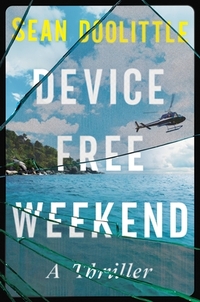Device Free Weekend by Sean Doolittle
 Monday, February 20, 2023 at 5:40AM
Monday, February 20, 2023 at 5:40AM 
Published by Grand Central Publishing on February 28, 2023
We spend too much time looking down at our phones. That, at least, is the argument made by a central character in Device Free Weekend, as well as an army of sociologists, psychologists, and talking heads. The character who makes that argument, Ryan, occupies a position similar to Mark Zuckerberg’s. The Zuckerberg clone is filled with regret that his social media site has contributed to various social problems, including divisiveness and alienation. The site connects people, but too many people connect to fuel their rage, fill their addled minds with lies, and organize or join hate groups. The site also makes it possible for Russia to influence elections and reduces the amount of time children spend with their parents. These are not original observations about the downside of social media, but they drive the plot in this not-quite-credible thriller.
Seven young people were friends in college. Ryan went on to develop a social media empire in Seattle called Link. Lanie and Beau got married and had kids. They used Link to become real estate influencers. Will and Perry also ended up as a couple. Emma was Ryan’s friend when they were children living in the same Minneapolis neighborhood. Stephen was Ryan’s best college friend until they had a falling out over Emma. But that was long ago, Emma and Stephen are divorced, and the hatchets were eventually buried. Or not.
Ryan invites his six college friends to join him for a device-free weekend on his private island off the coast of Washington. With all the elements of a college reunion relationship drama in place, Device Free Weekend adds a twist. Ryan is dying and he plans to take Link with him. Since he is not quite mentally stable, he wants to burden his friends by making them part of his personal drama. Mental illness is, I think, the only plausible explanation for the plot device that sets the story in motion.
We learned from The Big Chill that a reunion of friends can be a dramatic event, but Ryan isn’t satisfied with bringing friends together to rehash their emotional baggage. Ryan intends to lock them inside his island home and confront them with a version of the Trolley Problem. He has kidnapped the Link board members and tied them up on his yacht. He gives his friends a choice that they must make unanimously. They can push a red icon on a tablet and blow up the yacht, killing Ryan and the Board. Or they can push a green icon and approve Ryan’s plan to blow up the buildings that house Link and the company’s servers, causing massive economic damage but (since this will happen on a holiday) perhaps without inflicting death. If they do nothing, Ryan will blow up Link anyway, so he promises to make them multimillionaires if they press the green icon.
Ryan knows his friends won’t kill a boatload of strangers, even if they might want to kill him for trapping them all in his house. The real question is whether they will make themselves complicit in destroying Link, an event that will happen anyway. Ryan’s desperate need for his friends’ approval seems at odds with the certainty that, even if they press the green icon, they will never again approve of Ryan. Maybe he doesn’t care because he’s dying anyway. Maybe he’s such a narcissist that sucking his friends into his scheme is all that matters. Regardless of the exact nature of Ryan’s mental status, it is difficult to understand his motivation for testing the ethics of his innocent friends.
Naturally, the plan does not unfold as Ryan envisioned it. Events appropriate to a thriller ensue as his friends try to thwart his scheme. Will and Perry are inadvertently locked out of Ryan’s home when they should be locked in, setting up a chase across the island by Jud and Kai, two of Ryan’s underlings who are helping him with his insane scheme. The plan is further disrupted when Jud and Kai depart from the script. Meanwhile, the imprisoned friends quarrel about ethics while they try to escape from the house. Moderately entertaining action scenes involve explosions, chases (including a chase up a ladder affixed to a tower), and crashing a stolen TV news truck into a building. Sadly, none of this seems sufficiently real to be gripping.
As I’ve noted, the premise is hard to swallow, even if one accepts that a wealthy CEO might be so caught up in his own ego that he engages in unhinged behavior. Perhaps successful CEOs can become wildly irrational while maintaining control of their business empires; Musk’s erratic takeover of Twitter might be a less violent example. Perhaps people behave differently when they are on the verge of death and freed from considertation of consequences. Still, a deeper exploration of Ryan’s psyche might have resulted in a more convincing story.
Characters in general are a bit shallow. The Ryan-Stephen-Emma triangle takes a silly turn at the end, powered by Ryan’s megalomaniacal quest to control reality. The moment seems forced.
For a book that says “thriller” on the cover, Device Free Weekend is light on thrills. Still, the ending is not easy to predict and the story generates some fun moments. Ten years ago, I might have regarded Ryan’s lectures about social media as prescient and given the novel high marks for that reason. At this point, I have reservations about encouraging readers to spend time with a book that takes on obvious targets and doesn’t deliver the kind of engaging story that I want from a thriller.
RECOMMENDED WITH RESERVATIONS
Reader Comments